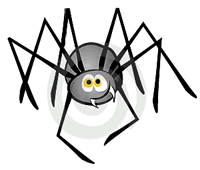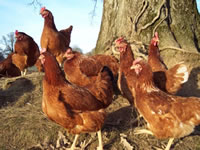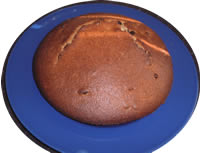
One thing we were discussing last week at the French conversation group was words for animals and their meat. In French the words for meat are also used for the animals: bœuf means beef and ox, porc means pork and pig, mouton means mutton and sheep, while in English there are different words for these things.
The popular explanation for the different English words for the animals and their meat is that after the Norman invasion of Britain in 1066, the animals were reared by the English, who called them cý, pecges and scéapes (cows, pigs and sheep) and eaten by the Normans, who called them boef, porc and motun (beef, pork and mutton). However the distinction between the names for the meat and the animals didn’t become set until the 18th century, and mutton and beef were used to refer to sheep and cows for many centuries after the Norman Conquest.
Bœuf comes from the Latin bos (ox, cow), the reconstructed Proto-Indo-European (PIE) root of which is gwóu (cow). This is also the root of vache, the French word for cow, via the Latin vacca (cow), and of the English word cow, via the Old English cú (pl. cý) and the reconstructed Proto-Germanic word kwom. In fact many of the words for cow, bull or cattle in Indo-European languages probably come from the PIE root gwóu. Examples include: bó (Irish and Scottish Gaelic), booa (Manx), buwch (Welsh), bugh (Cornish), buoc’h (Breton), govs (Latvian), կով (kov) (Armenian), گاو (gav – Persian) and Kuh (German).
As well as ox or steer and beef, bœuf also means (a) surprising; unusual; (b) stupid (in Swiss French); (c) (musical) jam session / jazz improvisation.
Idioms containing bœuf include:
- avoir un boeuf sur la langue (to have a cow on the tongue) = to keep quiet; not give anything away
- boeuf carottes (beef carrots) = internal affairs (Police)
- comme un boeuf (as an ox) = very strong
- gagner son boeuf (to earn one’s beef) = to earn a living
- on n’est pas des boeufs (we are not cattle) = a little consideration and respect, I beg you
Meanings of mouton include: (a) sheep; (b) mutton; (c) sheep / lamb (someone easily led); (d) stool pigeon / grass; (e) moutons = white horses (on waves) / fluff / fluffy or fleecy clouds. Mutton and mouton possibly come from the Gaulish multo (ram) via the Middle Latin multonem and the Old French moton (ram, wether, sheep).
Idioms containing mouton include:
- mouton à cinq pattes (a sheep with five feet) =
white elephant rara avis / rare bird (something difficult or impossible to find)
- revenir à ses moutons (to return to one’s sheep) = to return to the thread / subject of one’s discourse
- suivre comme un mouton (to follow like a sheep) = to act like everyone else; gregarious
Sources
http://www.anglo-norman.net/
http://www.ceantar.org/Dicts/MB2/mb04.html
http://www.indo-european.nl/
http://www.le-dictionnaire.com/
http://www.etymonline.com/
http://indoeuro.bizland.com/project/phonetics/word28.html



